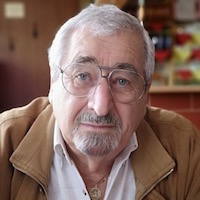News
Obituary: Jan Krcmar
Sunday 1 May 2022

Jan Krcmar (photo), who died in Vienna on Saturday aged 89, was a Cold War correspondent in Eastern Europe for three decades from the Prague Spring uprising to the Romanian revolution and more.
Krcmar was the son of a Czech diplomat who was posted in London when the Second World War broke out, and the family stayed there for the duration. His time there gave him a polished command of English.
On return to Prague, the father lost his job, and Krcmar was sent by the new Communist regime to work in a steel mill to learn proletarian ways. After de-Stalinisation, he could take up more suitable work as a translator.
Known to Reuters colleagues as Johnny, he joined after working for the Czechoslovak national news agency CTK, for whom he covered the 1968 Warsaw Pact invasion to forcibly end the reform movement led by Communist leader Alexander Dubcek.
Fifty years later he recalled: “It was completely irrational. Nobody knew what was happening. I lived one street above Czechoslovak Radio and I was woken up by my next-door neighbour who said ‘The Russians are invading us!’ and I thought, she’s an old lady, she probably listened to the radio and God knows what she heard, but then I heard the sound of big airplanes flying right over our house in the direction of the military airport in Kbely and they were coming in two-to-three-minute intervals. So I switched on the radio and the first thing I heard was a statement in bad Czech saying that the armies of the Warsaw Pact had come to the assistance of Czechoslovak patriots.”
Krcmar was again at the centre of the action more than 20 years later, this time in the Romania of communist dictator Nicolae Ceausescu.
When the anti-communist revolution took off in the border town of Timisoara in mid-December 1989 and Ceausescu's pervasive Securitate forces moved violently to hold the lid down, Reuters threw as many reporters it could find into the field, Richard Balmforth recalled.
“I was tapped on the shoulder since I had been on reporting assignments in Romania from Belgrade some years earlier and was deemed to know the lie of the land.
“When I drove into Bucharest after an eventful night in Timisoara that Christmas weekend, I found Jan ‘Johnny’ Krcmar, a veteran of Czechoslovakia’s Prague Spring uprising of 1968, already entrenched in the Intercontinental Hotel which was slowly filling up with the world's media and would soon be bursting at the seams.
“I had been stopped several times at roadblocks by vigilante groups looking for Ceausescu's men. I had heard gunfire. Johnny had seen far more excitement en route from Vienna. He had arrived in a private two-passenger light plane and just made it before the airport was closed. Sections of the army were still trying to decide which side they were on, so when he landed, and with gunfire crashing in the background, he was escorted by the army first to the Austrian embassy. There he sweet-talked the ambassador herself into punching out his story on telex from his handwritten text (there was a security issue prohibiting non-embassy staff actually touching the keys). It was Reuters first story out of revolutionary Bucharest!”
Krcmar had pre-booked rooms for incoming reinforcements. He had also set up an office in the Intercontinental Hotel and - crucially - hired a local journalist to work for Reuters - Adrian Dascalu who with his wife Roxana went on to become a mainstay of the Bucharest office for some years after. ■
- « Previous
- Next »
- 152 of 2176